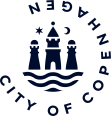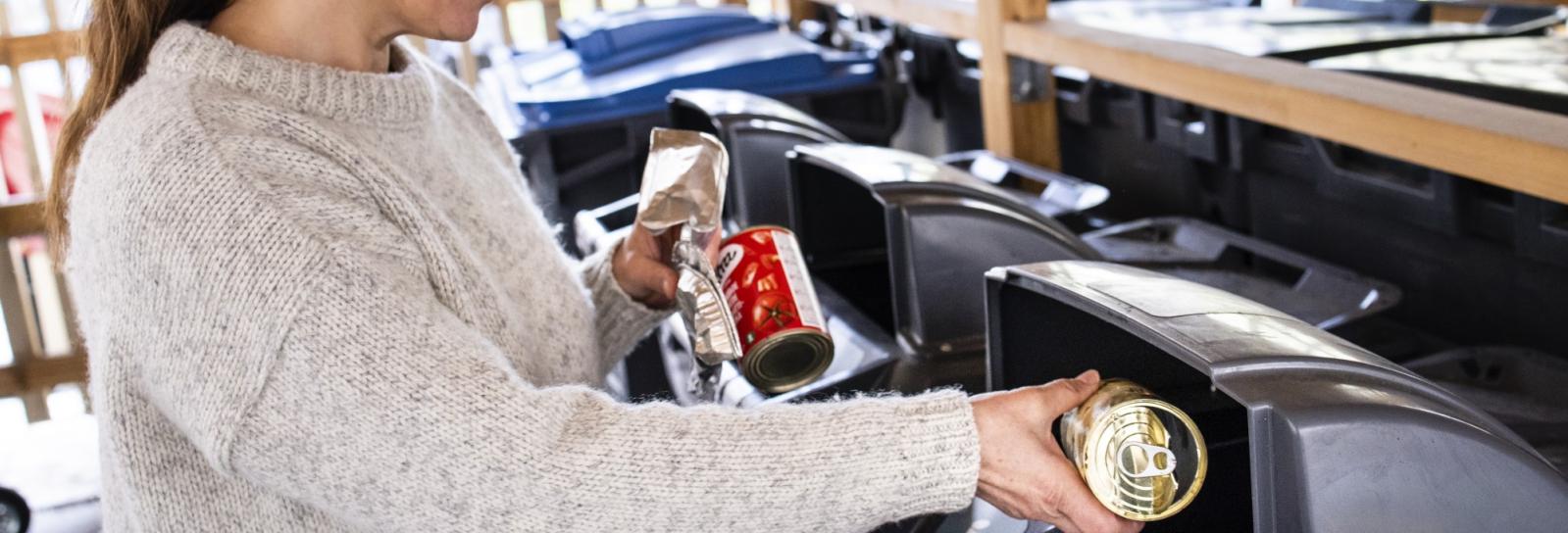Recycling in Copenhagen
The City of Copenhagen provides waste bins and collects waste from your property.
Visit the homepage affald.kk.dk for more information on sorting waste (Danish)
Depending on where you live waste bins and recycling bins can normally be found in your courtyard or basement.
If you are unable to find the right bin for your recyclable waste you can contact Nem Affaldsservice or look for the nearest recycling centre or local collection point.
Bio bags and bins for food waste
If you live in apartment, you can find a stand with bio bags for food waste in the courtyard by the bins. Here, you can also pick up a food bin and an adapter for your trash rack.
If you live in a house, you can tie one of your last bags to the handle of the food waste bin. The waste collector will then deliver new bags to you.
Bio bags, food bin and adapters for trash racks are also available at your nearest recycling centre and at most libraries. You can find an overview of places, where you can pick up bio bags, food bin and adapters on our website affald.kk.dk.
Information about your residential garbage service
If you need more information on garbage disposal at your residence you can use "Nem Affaldsservice". Here you can check collection dates, order optional or extra bins, report a problem etc.
Type in your address to start using the service.
Go to Nem Affaldsservice (Danish)
How to sort your waste in Copenhagen
Expand all
Cardboard (Pap)
Examples of recyclable cardboard:
- Paper towel rolls and toilet paper rolls
- Packaging boxes of toothpaste, washing power, dishwasher tablets, energy saving lamps, batteries, etc
- Cereal boxes, egg trays, packaging boxes for toys
- Shoe boxes
- Postcards
- Brown paper and brown paper bags
- Used pizza boxes (empty)
Juice cartons, milk cartons (tetrapak) and alike should be disposed as "Plastic, food and beverage cartons waste".
Read more about cardboard waste (Danish)
Electronic waste (Elektronisk)
Examples of recyclable electronics:
- All items with a cord and/or are powered by batteries or solar cells
- Small kitchen appliances such as stick blenders and microwave ovens
- Cell phones
- Chargers
- Electronic toys
- Television
- Appliances such as freezers, stoves and washing machines
Read more about electronic waste (Danish)
Food waste (Madaffald)
Examples of organic waste that should go into your green food waste bin:
- All types of food waste, raw or cooked
- Sauce and oil
- Eggs and eggshells
- Nuts and nut shells
- Coffee grounds and coffee filters
- Tea leaves, tea bags and tea filters
- Used paper towels
- Cut flowers
Read more about bio waste (Danish)
Garden waste (Haveaffald)
Examples of garden waste:
- Plants
- Fallen fruits
- Branches from pruning
Read more about garden waste (Danish)
Glass (Glas)
Examples of recyclable glass:
- All types of glass, jars and bottles (coloured and clear glass)
- Bottles with or without lids
- Drinking glasses
If you don’t have access to a municipal glass bin at your residence, you can dispose of recyclable glass at a recycling station or in one of the 550 public glass containers.
Read more about glass waste and locate a glass bin near you (Danish)
Hazardous waste (Farligt affald)
Examples of hazardous waste:
- Paints, solvents and chemicals
- Energy saving lamps and LED lights
- Batteries
Read more about hazardous waste (Danish)
Read more about how to dispose of batteries (Danish)
Read more about how to dispose medicinal waste as a citizen (Danish)
Large interior (Stort indbo)
Examples of waste sorted as Large interior:
- Discarded interior, which are too large to fit in a waste container with a closed lid.
- Mattresses
- Furniture made of materials other than wood such as garden furniture, carpets, strollers, etc.
- Plastic and metal objects, which are too large to fit in a waste container such as car safety seats, laundry baskets, drying racks, wheelbarrow, bumble-puppy, etc.
- Bicycles must be marked with the text ‘Fjernes af renovatør’ (To be removed by refuse collector).
Read more about Large interior (Danish)
Metal
Examples of recyclable metal:
- Coffee and tea boxes
- Food cans
- Metal candlesticks
- Magazine holders
- Curtain clips
- Storage boxes
- Cutlery made of metal
- Cookware
- Hammer
- Screwdrivers, pliers, nails, screws, metal hooks and door handles
Since metal is melted at a very high temperature, it is ok to recycle metal items with some wood or plastic attached to them.
Read more about metal waste (Danish)
Paper (Papir)
Examples of recyclable paper:
- Newspapers
- Magazines
- Advertisements
- Envelopes
- Wrapping paper
- Books
- Office paper
Paper and cardboard should be clearly separated for recycling.
Brown paper and brown paper bags should be diposed as "cardboard waste".
Read more about paper waste (Danish)
Plastic, food and beverage cartons (Plast, mad- og drikkekartoner)
Plastic waste should be free from food residue and liquid.
Examples of recyclable plastic:
- Containers and canisters for dishwashing liquid/detergents
- Containers for storing good
- Plastic trays and bags from meat, fish or vegetables
- Drink bottles and plastic bottles without a deposit mark
- Cookware, toolboxes and cutlery made of plastic
- Food and beverage cartons, e.g. juice and milk cartons (e.g. TetraPak)
Read more about plastic waste (Danish)
Residual waste (Restaffald)
Residual waste is incinerated and used to produce district heating and electricity.
Examples of residual waste:
- Diapers
- Sanitary waste
- Packaging fillers
Read more about residual waste (Danish)
Wood – indoors (indendørs træ)
Indoor wood is discarded wood, which has been used indoors. For example:
- Wooden furniture – both untreated, lacquered, and painted ones.
- Sheets, planks, and boards as well as built-in cabinets from indoor do-it-yourself projects.
- Pallets must be marked with the text ‘Fjernes af renovatør’ (To be removed by refuse collector).
Read more about Wood – indoors (Danish)
Recycling centres and local collection points
You can also recycle your waste at a recycling centre (genbrugsstation) or a collection point (nærgenbrugsstation).
A collection point is smaller, only accepts certain types of recyclable waste, and is accessible by foot only.
Both recycling centres and local collection points are staffed and have a “swap stand” where you can donate or collect items which are still usable.
Deposit and return system
In Denmark, you pay a deposit ('pant' in Danish) each time you buy drinks in cans or bottles with a deposit mark. You can get your deposit back by returning empty cans and bottles using reversed vending machines.
Contact
Område for Affald og Ressourcer
Njalsgade 13
Phone hours
09:00 - 16:00
09:00 - 16:00
09:00 - 16:00
09:00 - 16:00
09:00 - 16:00

